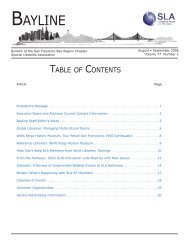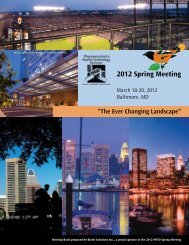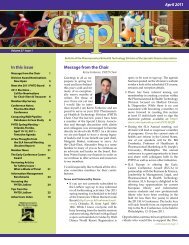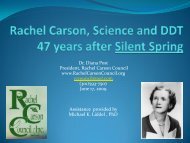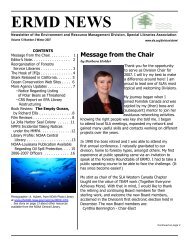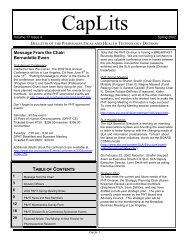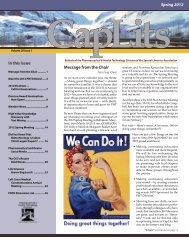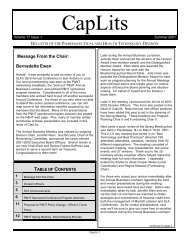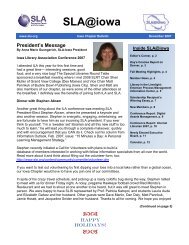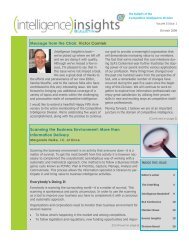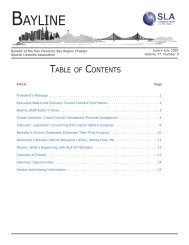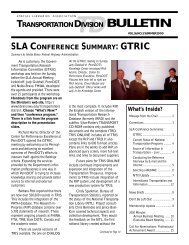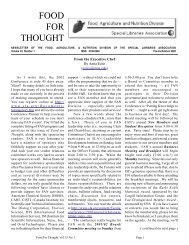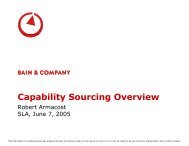Education Libraries - Special Libraries Association
Education Libraries - Special Libraries Association
Education Libraries - Special Libraries Association
You also want an ePaper? Increase the reach of your titles
YUMPU automatically turns print PDFs into web optimized ePapers that Google loves.
Prereading Exercises, we learn that the exercises<br />
“provide readers with a chance to think about what they<br />
are about to read. Key elements in effective prereading<br />
exercises focus on purpose (why they are reading), text<br />
format (how the passage is organized), and prior<br />
knowledge (what they already know about the topic)” (p.<br />
1).<br />
Chapter Two, Exploring Fiction, recommends classroom<br />
exercises that build on the relationship between readers<br />
and characters. “Once readers establish a reason to care<br />
about a character, they are willing to invest some time<br />
and emotion in a shred journey,” eager to see how the<br />
plot unfolds (p. 28).<br />
Chapter Three, Exploring Nonfiction, explains how<br />
becoming familiar with expository text structures—<br />
description, sequence, comparison, cause and effect, and<br />
problem and solution—“enhances readers’ chance of<br />
being able to comprehend the authors’ message” (p. 55).<br />
The importance of understanding alternate methods<br />
authors use to convey information, such as charts and<br />
graphs, is addressed in the exercises. The need to<br />
consider reading behaviors suited to learning about<br />
ideas, concepts, and opinions is also covered.<br />
Readers Responses (Chapter Four) provides<br />
opportunities for students to “share their perspectives<br />
about the text by participating in some form of<br />
postreading activity” (p. 79). It helps teachers provide<br />
meaningful evaluation beyond test examination.<br />
Exercises in this chapter focus on creating alternative<br />
endings or linking the story to personal experiences.<br />
Chapter Five, Note-Taking Strategies for Students,<br />
shows how the Cornell Note Taking System “coupled<br />
with effective listening behaviors and solid study habits,<br />
form the basis of a successful school career.” Exercises<br />
in this chapter “will help students become proficient note<br />
takers” during lectures (p. 106).<br />
Building and Reinforcing Student Vocabulary (Chapter<br />
Six) equips students with strategies for acquiring new<br />
words “as they become necessary for daily life…<br />
through a study of word origins or by grouping the<br />
words into categories based on definition or function”<br />
(p. 122). The author suggests how games and puzzles<br />
can be used to reinforce vocabularies.<br />
Chapter Seven, Exploring Research Resources,<br />
recommends that teachers “determine beforehand how<br />
much (or little) students know about how to navigate”<br />
the World Wide Internet (p. 141). To illustrate gaps in<br />
practical knowledge, Ms. Groeber uses the example of<br />
students who know how to get directions by using<br />
Mapquest, for instance, “but cannot identify the capital<br />
city of a state or country” (p 142). The activities<br />
presented in this chapter will help students in middle<br />
school and high school connect their use of the Internet<br />
with subject projects.<br />
Chapter Eight, Improving Study and Test-Taking Skills,<br />
recommends pretesting and stresses the importance of<br />
taking good notes, as well as using other study aids. It is<br />
a fitting conclusion to a practical volume that should be<br />
given to all teachers.<br />
Barbie E. Keiser is a information resources<br />
management consultant located in the metro-<br />
Washington, DC, area. Email: barbieelene@att.net<br />
No Challenge Left<br />
Behind:<br />
Transforming<br />
American <strong>Education</strong><br />
Through Heart and<br />
Soul—Reviewed by<br />
Rachel Wadham.<br />
Houston, P. D. (2008).<br />
No Challenge Left<br />
Behind: Transforming<br />
American <strong>Education</strong><br />
Through Heart and<br />
Soul. Thousand Oaks,<br />
CA: Corwin Press.<br />
ISBN: 978-1-4129-<br />
6862-1. $28.95.<br />
No Challenge Left Behind: Transforming American<br />
<strong>Education</strong> Through Heart and Soul is a collection of<br />
previously published essays by former school<br />
superintendent and executive director of the American<br />
<strong>Association</strong> of School Administrators, Paul D. Houston.<br />
While all the essays are relatively short, most under<br />
three pages, they each pack a punch with challenging<br />
thought provoking ideas coupled with great storytelling.<br />
The book is divided into four sections. In section one the<br />
essays focus on the basic building blocks of leadership.<br />
Sensible advice in this section ranges from ways to find<br />
your own voice to ways to connect with others. The<br />
second section focuses on the role of superintendents in<br />
schools and the educational process. While the advice<br />
here is mainly intended for a specific kind of leader, the<br />
fundamental truths and ideas will be widely applicable to<br />
<strong>Education</strong> <strong>Libraries</strong>, Volume 31, No. 2, Winter 2008 53



